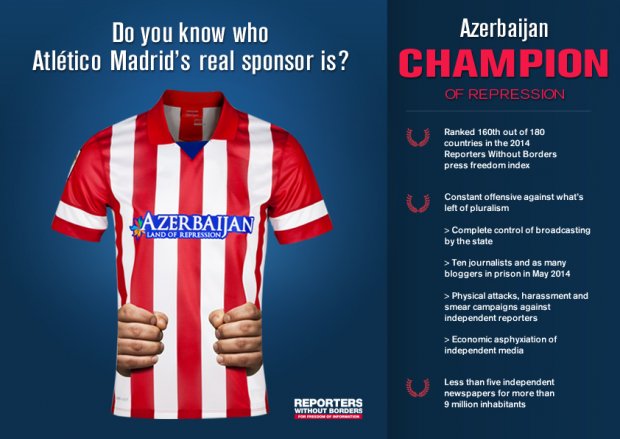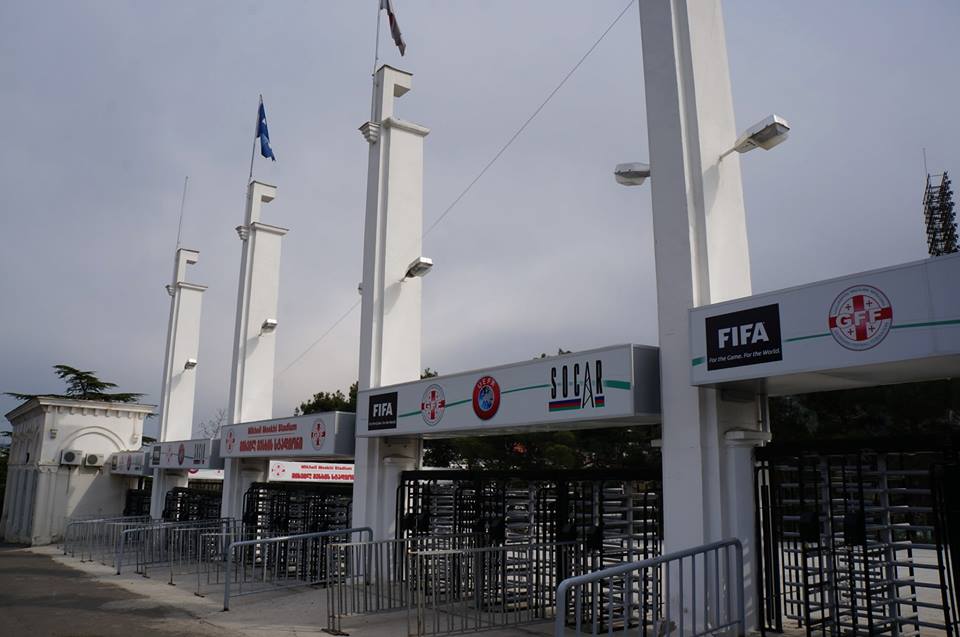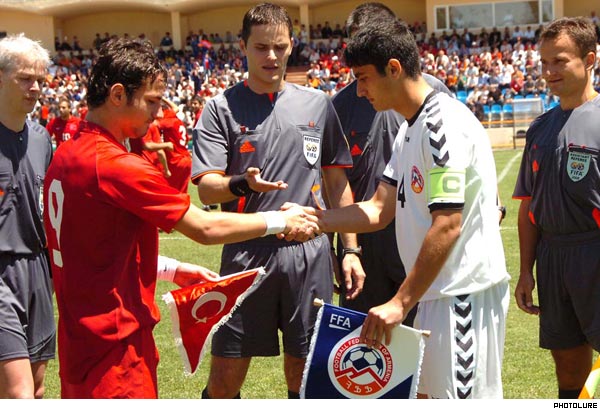It was yet another hard fought battle, but in the end last year’s Champions League finalist and Spanish Champion Atlético Madrid defeated the German club Bayer Leverkusen in a penalty shootout to reach the quarterfinal of the Champions League. With Diego Simeone at the helm the club has now managed to gain a reputation as the hard fighting underdog that can hold its own against the giants of Spanish and European football.
Much of Atlético’s success, however, hinges on a gigantic sponsorship agreement that the club signed with Azerbaijan’s tourism industry. The deal was signed in 2013, and was supposed to run for one and a half years. Worth €12 million the deal included not only a shirt sponsorship but also saw the Atlético squad travel to Azerbaijan where they trained young Azerbaijani footballers in the capital Baku.
Land of Fire and Atlético: “Much more than a Sponsorship”
The deal proved to be a huge marketing success for Azerbaijan, but also for Atlético. Both parties agreed at the beginning of the season to extend the agreement to June 2015. Atlético stated on their homepage: “Sport is an excellent platform for global communication, used to transfer messages, actions and project global business strategies.” The page reads further: “Azerbaijan is a country with great economic potential, it is one of the economies with the highest growth rate in the world. Noted for its energy sector, since two thirds of the country’s area rich in oil and natural gas.”
At the same time, however, Azerbaijan also has a poor track record in terms of human rights and press freedom. At the eve of the Champions League final in Lisbon where Atlético faced city rival Real Madrid, Reporters without Borders issued a statement condemning Azerbaijan’s sponsorship of Atlético Madrid.
The statement read as follows: “Do you really know Azerbaijan, the country that sponsors Atlético Madrid? “Land of fire” according to the official propaganda but “land of repression” in practice.” Furthermore, Reporters without Borders pointed out that the country had jailed no fewer than 10 reporters and bloggers for displaying too much independence from the government.
High profile cases include the imprisonment of reporter and human rights activist Parviz Hashimli, who was sentenced to an eight-year sentence in May 2014 on trumped up charges of having organized the sale of Iranian weapons. Another journalist, Rauf Mirkadyrov a well-known columnist for the Russian-language newspaper Zerkalo, was arrested for supposedly working as an Armenian spy. Azerbaijan currently ranks 160 out of 180 countries on the freedom of press index, and President Ilham Aliyev has been accused of eliminating any press duality within the country.
Land of Fire – A Global Sports Marketing Campaign
Atlético, however, are not the only football club that have become part of the global sport marketing campaign for Azerbaijan. The slogan Land of Fire has also since appeared on the shirts of French club RC Lens and English club Sheffield Wednesday. For both clubs the Azerbaijani oligarch Hafiz Mammadov has been a significant factor in these sponsorship deals.
Hafiz Mammadov is the owner of RC Lens, FC Baku, and also is a shareholder of FC Porto, as well as Atlético Madrid. As the chairman of the Baghlan Group, an oil and gas consortium, Mammadov is well placed within the Azerbaijani business world to act as an intermediary in arranging business deals between Azerbaijan and European football clubs.
At the same time as Mammadov has been successful in signing advertisement deals between European clubs and Azerbaijan, his takeover of Sheffield Wednesday was unsuccessful due to financial reasons, as he failed to transfer £40 million to the current ownership group of Sheffield Wednesday, as it appears that Mammadov was unable to secure the necessary funds. Despite this, Wednesday has still been wearing the Land of Fire slogan this season, further enhancing Azerbaijan’s marketing value in the world of sport.
Clubs like Sheffield Wednesday and RC Lens are important targets for the Land of Fire campaign, as they both have a relatively large fan base, but have also accumulated massive debts, which make them financially dependent on huge sponsorship agreements such as the Land of Fire campaign offers. The same is true for Atlético, which despite its recent successes has accumulated a massive debt of £84 million in unpaid taxes. This alone makes the club vulnerable in terms of having to generate currency.
Azerbaijan more than just the land of Fire
The Land of Fire campaign is not the only foray by Azerbaijan into the world of football. In 2013 the State Oil Company of Azerbaijan Republic (SOCAR) signed an exclusive sponsorship agreement with UEFA as the Official Sponsor for UEFA’s national team competitions, including the UEFA European Football Championship. It is understood that SOCAR is paying €80 million over four years. The country will also host the extravagant EURO 2020, which will see matches all over Europe, as well as in Baku.
As Thomas de Waal writes in his excellent book The Caucasus, SOCAR was founded in 1992 and was headed by Ilhan Aliyev. Now the head of the state of Azerbaijan, he has used the company to strengthen the foundation of Azerbaijani statehood.
SOCAR has also been influential across the Caucasus by signing advertisement and sport development agreements in Georgia. As Georgia Today wrote in April 2012: “SOCAR continues taking care of Georgian football”. Here the oil company has made a significant contribution in supporting infrastructure development, for example by contributing financially to the repair works of football stadiums in the region.
SOCAR’s advertisement arrangements across Europe, however, are also part of Baku’s larger marketing strategy. Financial contributions into Europe’s most popular game must be understood as political lobbying by the Baku administration headed by president Aliyev.
The company has been used as a political tool in the Caucasus region and beyond. On 14 October 2009 the presidents of Turkey and Armenia met in Bursa to watch a football match between the two countries, an event that marked the first steps of diplomatic relations between Turkey and Armenia. Actions such as these are now often referred to as football diplomacy.
Azerbaijan, which has seen conflict with Armenia over the separatist region of Nagorno-Karabakh since the fall of the Soviet Union, considers the possible rapprochement between Turkey and Armenia as a danger to its own political goals in the region, especially in Nagorno-Karabakh.
Azerbaijan then negotiated a deal with Gazprom that would see SOCAR selling gas to Russia, a move that was seen as a political snub to Turkey especially after Ilham Aliyev declared in an official statement that Azerbaijan had been selling gas to Turkey for a third of the world price and would now be looking for alternative markets.
SOCAR and Land of Fire: Sports Propaganda
This last episode highlights that Azerbaijan has understood the power of its oil and gas wealth to both increase its image abroad but also to use that wealth in order to increase political pressure, and influence in the immediate region.
Football is an important instrument in this marketing effort, if oil and gas are the stick, football is the carrot which Azerbaijan can use as an important marketing tool in order to over-paint issues such as human rights abuses at home. The image of Atlético’s success with the Land of Fire slogan therefore goes a long way to underplay the many issues of the country.
Here Azerbaijan has taken a leaf from the sports propaganda book of its neighbour, the Russian Federation. In many ways the Land of Fire, and SOCAR sponsorship agreements mirror the deals organized by Gazprom. Like Gazprom has achieved with German club FC Schalke 04, the Land of Fire campaign has targeted clubs that are in financial need, but at the same time can muster a huge fan base. Also, just like Gazprom, SOCAR has signed regional and global deals with football organizations such as the Georgian FA but also UEFA. This serves the purpose to lobby both globally but also regionally for Azerbaijan’s issues, such as the Nagorno-Karabakh conflict.
Gazprom, and Land of Fire in Football: The end of Oil Money?
There is, however, another real danger for the likes of Atlético Madrid. Falling oil prices and the dispute between Russia and the West may also impact Azerbaijan’s sponsorship agreements with football clubs, and football federations. As Futbolgrad reported on February 19, the falling the rouble crisis and falling oil prices has already seen a potential marketing shift that could see Gazprom severing ties with the likes of Schalke and Chelsea.
The Azerbaijani economy is deeply intertwined with Russia. The fall of the rouble has sparked the return of many migrant workers from Russia and falling oil prices may make it difficult for the regime to gloss over social problems by lavishly spending on foreign social projects. In light of this, the Azerbaijani government may cut back on its football propaganda in an effort to keep the peace at home by spending more on domestic projects instead.
The financial uncertainties could explain why Mammadov failed in his attempt to purchase Sheffield Wednesday, as amidst the new financial realities his financial backers in the Azerbaijani government may have decided that the purchase of a English club was no longer in the best interest for Azerbaijan. The financial withdrawal of Azerbaijan from the European market may also result in a major problem for Atlético Madrid, as the club’s massive tax debts make them dependent on the oil money received from the Caucasus.
Manuel Veth is a PhD candidate at the University of London King’s College, London. Originally from Munich, his thesis is entitled: “Selling the People’s Game: Football’s transition from Communism to Capitalism in the Soviet Union and its Successor States”. Follow Manuel on Twitter @homosovieticus
























COMMENTS